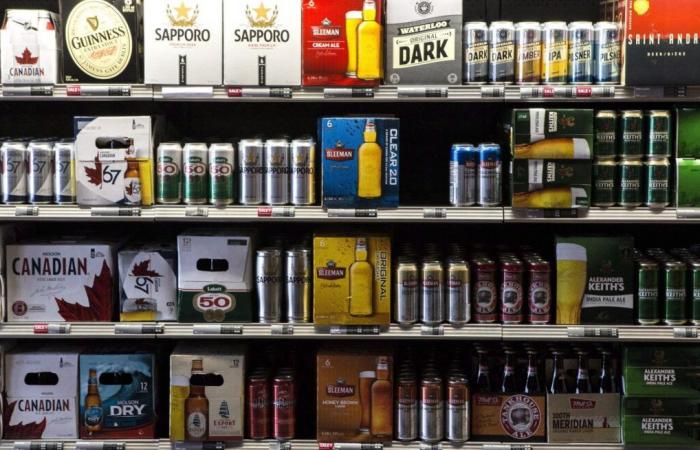Should a warning about the harmful effects of alcohol on health be included on bottles of beer, wine and spirits, as is done for tobacco and cannabis? The idea recently launched by the chief medical officer of the United States is echoed in Quebec. Experts interviewed by Duty want labeling, but indicate that the industry’s reluctance may weigh too much in the balance.
“Consumers have the right to have this information, whether in Quebec or elsewhere,” immediately launches Jean-Sébastien Fallu, professor at the School of Psychoeducation at the University of Montreal and expert in prevention of drug addiction.
In addition to the effects on health, labeling “which should have been given for a long time – and it is quite surprising that it is not” should present the nutritional values and the equivalent of a standard glass, expresses Mr. Fallu. “We can send messages about the number of reduced-risk drinks, but if we are not able to calculate [ce qu’est une consommation]it doesn’t do much,” he explains.
An opinion shared by Kim Brière-Charest, project director at the Association for Public Health of Quebec (ASPQ). “We’ve been recommending it for a while now [au gouvernement] to provide more information so that people can make informed choices,” she explains. Mme Brière-Charest gives the example of the law surrounding cannabis, “which required certain information related to health”.
For Jean-Sébastien Fallu, however, we must avoid falling into the trap of adding “shocking images like we see on cigarette packets” to the labeling of drinks. “We must take into consideration the tobacco culture where we were perhaps already on a good path, so banning tobacco in bars, in restaurants, it worked because the population was there, but if we did that tomorrow morning with alcohol, I think there would be riots,” maintains the expert.
Beyond labeling
Even if it was a step in the right direction, “labeling has its limits,” warns Jean-Sébastien Fallu. According to the professor, it is on the social level that the biggest changes could take place.
“What determines the levels of consumption, the extent of consumption, it’s more than just knowledge [sur le fait que] It’s a carcinogen or not. There are really a lot of factors that determine people’s consumption levels, and the factors are not just individual — at the cognitive level of knowledge — they are also social and structural,” he says.
Changing the culture around a product like alcohol through public health measures can be complicated, if only by “reactance theory,” notes Mr. Fallu. “There are a lot of people who don’t like that, being told what to do. When we tell them what to do, they do the opposite. It can even increase their risk [de consommation]. But, on the other hand, when accessibility is too restricted, it produces perverse effects, illegal markets, etc. “, he explains.
Is there a solution, then? For Jean-Sébastien Fallu, the “most effective thing to do immediately, if we wanted to reduce risky consumption”, would be to ban alcohol advertising. “There is no perverse effect in banning advertising, it will have no backlash. Then, once again, for tobacco, we did it. We did several things, but we did this and it reduced consumption,” explains the drug prevention expert.
A vision once again shared by the ASPQ and Kim Brière-Charest, who explains that she is in the process of “improving the supervision of alcohol from a public health point of view”, particularly “in terms of improving education, and also to review even the supervision of marketing, knowing that advertising will also contribute to increasing the frequency and quantity of alcohol consumed by the population.
Mme Brière-Charest still mentions that it is necessary to “find a balance”. “So that people can feel that yes, they can consume, but also by reducing the risk, or at least by taking these risks into account. »
Possible changes?
If experts in the field and organizations like the ASPQ indicate that they want these changes, why are they not being implemented? The answer is “quite simple”, maintains Jean-Sébastien Fallu: the alcohol lobby which is very powerful in Quebec and even elsewhere, such as in France or the United States.
“There have even been pilot projects [pour un meilleur étiquetage] in Western Canada, in the Yukon. But it was ultimately withdrawn because of pressure from the alcohol industry,” he recalls, asserting that the alcohol lobby “prevents several public health actions.”
“I will always remember that within a year, I testified before the committee on a study of the bill on the legalization of cannabis in Quebec, where people in the industry were really demonized, not welcome. Then, in the same year, I testified before a commission on a change in the law governing alcohol, and then people from the industry were on the commission. So, there is really a difference,” says Mr. Fallu by way of example.
Kim Brière-Charest recognizes that it is “a challenge for the industry to be able to adapt” to prevention measures such as labeling or stopping advertising, but she also notes “growing awareness among the population generally, therefore potentially also including within the alcohol industry.
It remains to “know how we can ensure that we continue to make products available, therefore not stigmatize consumption, but still ensure that we have messages promoting safe behavior.”
To achieve the changes desired by Jean-Sébastien Fallu, he believes that we must “continue to talk about it, to raise awareness among the population, but in an intelligent way”. We must also “avoid falling into the other extreme, which is reductionist, disconnected from reality, which scares the world, then which discredits and discredits almost everything that public health would like to do, because it is exaggerated,” he warns.
The Union québécoise des microdistilleries did not wish to comment on the matter for the moment. “Since we have not studied the ins and outs of this measure, we are not in a position to [la] comment at this time,” she said by email. The Quebec Brewers Association also expresses that it does not want to comment at this time.






